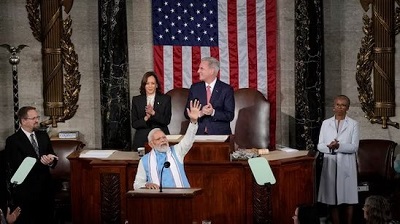Washington, (Samajweekly) US lawmakers, pushing a legislation that seeks to fast-track the sale of arms and weapons to India with the same speed as those meant for close allies, have stopped talking it up as a “NATO Plus” arrangement in a nod to New Delhi’s skittishness about being perceived as an ally.
Main Content
A legislation moved by a bipartisan group of members of the House of Representatives Monday to add India to a list of countries whose military purchase orders in government-to-government deals enjoy expedited clearance did not mention the phrase “NATO Plus” even once.
A companion legislation moved last week by a bipartisan group in the US senate proposed the same benefits for India but, once again, did not mention the phrase NATO Plus.
“For clarity we’re avoiding the phrase NATO Plus in connection with this bill but only to avoid any confusion in thinking this would be a direct step toward India joining NATO as opposed to the separate but significant strengthening of other defense ties it represents,” said a congressional aide.
Asked if it had anything to do with India’s problems with the NATO Plus branding, the aide said: “Not as a result of any of those objections, just a more general desire to avoid any confusion with such issues while still emphasising that this is a US policy to provide India with additional benefits of a deeper relationship with the US…”
Both Bills propose that India should be added to a list of countries whose arms purchase enjoy expedited approval under the US Arms Export Control Act (AECA), as it is done for all members of the North Atlantic Treaty Organisation Treaty (NATO) and US treaty allies Australia, New Zealand, Japan, South Korea and Israel, which are also known as NATO Plus 5 countries.
India would welcome, it’s understood, the special benefits of expedited clearance of its military purchase orders but not designations that threaten the optics of its strategic autonomy.
“That is not a template that applies to India,” External Affairs Minister S. Jaishankar said at a news conference in May when asked about a recommendation by a US Congress committee on China to include India in the expanded NATO Plus grouping as a part of America’s larger strategy to deter China from invading Taiwan.
The External Affairs Minister did not only convey India’s opposition to the idea but insisted that the Joe Biden administration understood India’s position. He said: “So I must say, a lot of it is actually outside the administration. The administration understands this very, very well. So we have a situation where actually in many areas, the administration has been very forthright, very understanding, very cooperative.”
US lawmakers have been pushing extension of these benefits to India. And just ahead of Prime Minister Narendra Modi, Senator Mark Warner, the Democratic co-chair of the India Caucus, had announced plans to introduce a legislation along with the Republican co-chair John Cornyn. that will propose “adding India to the so-called NATO Plus arrangement where the United States is able to transfer with as little bureaucratic interference as possible defense equipment in a very strong way”.
But the legislation he and Cornyn introduced in the Senate did not mention the phrase NATO Plus, which is also missing from the companion bill introduced in the House of Representatives by Democrats Raja Krishnamoorthi, Ro Khanna and Marc Veasey and Republicans Any Barr and Mike Waltz.
“Strengthening the US-India strategic partnership is vital to the prosperity and security of not only both nations, but also other democracies around the world,” Congressman Krishnamoorthi said.
“That is why I am proud to join my colleagues in introducing this legislation to expand security cooperation between the United States and India by adding India to the list of partners included in the Arms Export Control Act.”
India will be watching the progress of the legislation which must now go through the congressional process before it reaches the President, either on its own or part of the National Defense Authorization Act 2024 (which the is annual defense budget) for enactment. The measure has been proposed every year in one form or the other since 2019, but has failed to run the entire process for one reason or the other.










